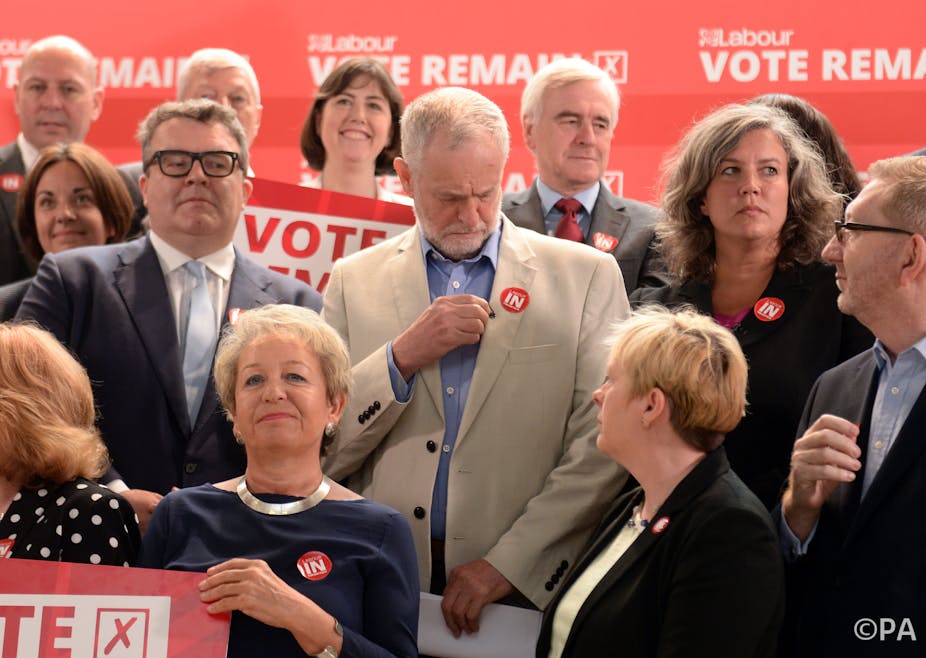Brexit and its aftermath continues to wreak havoc on British politics. David Cameron’s wreckless and unsuccessful gamble may eventually lead to the break-up of the United Kingdom but that is in the long term. In the short term, the failure of the Remain campaign, and Jeremy Corbyn’s perceived culpability in it, is tearing the Labour party apart. This may be the week that finally breaks Labour.
The co-ordinated string of resignations from the shadow cabinet that followed the Brexit vote was designed to pressure Corbyn to resign as leader of the party. MPs have never accepted Corbyn’s leadership and the Brexit debacle presents the opportunity to replace him before changes to the party’s rulebook that make his position more secure are pushed through by his supporters at the Labour Party Conference in September. MPs recognise that this is a crucial moment in the battle for the future of the Labour Party. Many are now prepared to gamble their own political careers on that future.
Deputy leader Tom Watson warned Corbyn that he has lost the confidence of MPs in a gesture many are seeing as a firm elbow towards the exit.
But Corbyn, backed by key allies such as the shadow chancellor, John Mcdonnell, shows no sign of backing down. He fully expects to defeat a leadership challenge.
Corbyn’s confidence comes from two sources. He remains very popular with the party membership, which is now decisive in any leadership contest and seems content with the current direction of travel. Any possible challenger, therefore, would have to be able to trump that popularity with the rank and file and there aren’t that many of them in the Parliamentary Labour Party at present.
Corbyn’s conception of what the Labour party is for also gives him confidence in his position. For Corbyn, the Labour party in parliament is in many ways secondary to the broader labour movement in the country. Real social change is to be achieved over the long term through organisation, agitation, and direct action, as much as it is through debates, votes, and detailed committee work in parliament. As long as he has the members and the unions on his side, Corbyn will feel relatively secure.
Splitting to survive
All this means that if a leadership challenge takes place it will quite probably determine whether or not the Labour Party goes forward as a viable party of government.
If Corbyn is removed there is a chance that the Labour Party might eventually recover as an electoral force, although it will have to find a political narrative that can regain lost ground from its competitors. To have any chance of beating Corbyn, however, MPs will have to unite around a single candidate rather than split the anti-Corbyn vote, as happened last year. Someone from the party’s soft left such as Angela Eagle or Owen Smith would fit the bill.

If, as is quite likely, Corbyn or someone else from Labour’s hard left emerges as the winner then the Labour Party as we know it will be broken. This may not necessarily be a bad thing, as the tectonic plates of electoral support shift.
At present Labour is losing support to the SNP in Scotland, to UKIP in its English and Welsh heartlands and, in the light of Corbyn’s half-hearted support for Remain, may well see the support of disappointed middle-class pro-Europeans shift towards the Liberal Democrats (who have pledged to go into any future election committed to reversing the decision to leave the European Union). It is hard to see how Labour in its present form can regain the ground it has lost.
Opponents of a split claim Labour is a broad church. They often cite the failure of the SDP breakaway in the 1980s as proof that such a move would be folly. But it is 2016 not 1981, political loyalties are more fluid, and the success of the SNP and UKIP demonstrates that it is possible to organise and win in Labour heartlands.
Indeed, the whole idea of a Labour heartland may be a thing of the past. Perhaps in the long run a split between an explicitly socialist and anti-European Labour party and a new pro-European social democratic force, unshackled from any formal links to the unions and willing to cooperate with progressive politicians from other parties, would better reflect and cater for the diverse views of the UK’s neglected and angry voters.

